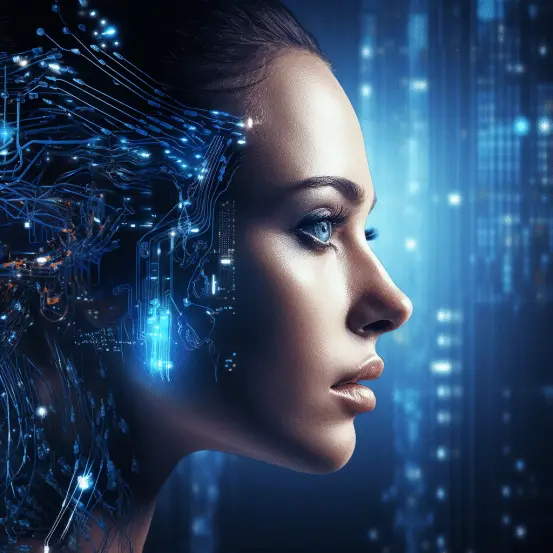
AI benefits and privacy rights in recent years, the advancements in Artificial Intelligence (AI) have revolutionized numerous industries, offering unprecedented capabilities and efficiency.
As AI becomes more prevalent in our daily lives, privacy issues have arisen.
The Privacy Dilemma
The utilization of AI necessitates the collection and analysis of vast amounts of personal data. From voice recognition to behavioral patterns and location information, AI systems thrive on data, raising questions about the degree to which our privacy is compromised in the digital age.
To improve healthcare, security, and user experience, people should assess the dangers before sharing personal data with AI.
Balancing these advantages with privacy concerns is key to harnessing the full potential of AI.
Establishing Ethical Guidelines
As the world becomes increasingly dependent on AI, it is crucial to establish ethical guidelines to safeguard personal privacy. Governments, regulatory bodies, and technology companies must collaborate to create comprehensive data protection laws and standards that ensure responsible AI usage.
Transparency and informed consent should be at the forefront of any data collection effort. Individuals must be fully aware of what data is being collected, how it will be used, and have the ability to provide or withdraw consent. User info should be made anonymous as much as possible so that people can’t be found, but it should still be useful.
Securing AI Systems
Protecting AI systems from unauthorized access or malicious intent is vital to preserving personal privacy. Stringent cybersecurity measures must be implemented to safeguard the data collected and prevent potential breaches. Encryption, access controls, and regular security audits should be standard practices to mitigate risks.
Educating Users on Privacy
In the digital age, educating users about personal privacy is of utmost importance. Individuals should be informed about AI systems’ functioning, data collection practices, and the potential risks associated with sharing personal information. Promoting digital literacy empowers users to make informed decisions and take necessary precautions to secure their privacy.
“Privacy is not negotiable. It is the right of every individual to have control over their personal information.” – Unknown
The Future of AI and Privacy
The future of AI and personal privacy lies in finding a delicate balance. Innovation should not come at the expense of individual privacy. We can stay private in the digital age by putting in place strong data security laws, making sure AI systems are safe, and raising awareness.

Conclusion
As AI becomes deeply embedded in our society, finding the right balance between technological advancements and personal privacy is crucial.
We can use AI’s promise to protect privacy in the digital age by adopting ethical principles, securing AI systems, and educating users.
Which ethics should be considered while designing personal data-handling AI systems?
Designing AI systems that manage personal data should address ethics:
1. Privacy:
Data privacy is crucial and should be protected. The AI system should have appropriate security measures in place to safeguard personal information and prevent unauthorized access or misuse.
2. Consent and transparency:
Individuals should be informed about the collection and use of their data by the AI system. Clear consent mechanisms and transparent communication about data handling practices should be implemented.
3. Data accuracy and bias:
AI systems should be developed with accuracy and fairness in mind. Developers should be cautious of biases that can be present in the data or algorithms used, as these biases can lead to discrimination or unfair treatment of certain individuals or groups.
4. Data minimization:
Only necessary and relevant personal data should be collected and stored. Developers should minimize the collection of unnecessary information to reduce the risk of potential misuse or violation of privacy.
5. Accountability and liability:
Clear ownership and responsibility for the AI system’s actions should be defined. Developers and organizations should be accountable for any potential harm caused by the system’s handling of personal data.
6. User control and empowerment:
Individuals should have control over their personal data and the ability to access, modify, or delete it. AI systems should provide user-friendly interfaces and options for individuals to manage their data and privacy preferences.
7. Social impact and benefit:
Developers should consider the wider societal impact of the AI system and ensure it aligns with ethical norms and values. The system should aim to benefit society as a whole and not cause harm to individuals or marginalized communities.
8. Regular audits and evaluation:
Ethics should extend beyond growth.To maintain ethical standards and resolve issues, the AI system’s data management processes should be audited and evaluated regularly.
It is essential for developers to involve interdisciplinary teams, including ethicists and legal experts, to ensure a comprehensive approach to handle personal data in AI systems ethically.
How can artificial intelligence (AI) be used to make sure people’s privacy is protected in the digital age?
AI can increase digital privacy in these ways:
1. Privacy-preserving AI algorithms:
Using federated learning or differential privacy, AI algorithms can process data privately. Federated learning trains AI models on decentralized data without sharing sensitive data with a central server. Differential privacy protects privacy by hiding data points in aggregated data.
2. Anonymization and de-identification:
AI systems can anonymize personal data by eliminating or encrypting PII from datasets.
Companies can utilize the data for research and AI without compromising privacy.
3. Privacy-focused data handling:
AI can secure and encrypt personal data.
.Examples of how AI may improve security include its ability to spot unusual access patterns and keep sensitive data safe throughout transmission and storage.
4. Personalized privacy settings:
AI can assist in dynamically setting and managing individual privacy preferences. By analyzing user behavior and preferences, AI can recommend privacy settings tailored to specific individuals, granting them control over their digital privacy.
5. Automated privacy auditing:
AI algorithms can be employed to automatically audit and monitor privacy controls and policies to ensure they are being adhered to. This can help identify and rectify privacy vulnerabilities or breaches promptly.
6. Enhanced threat detection:
AI can aid in identifying and mitigating privacy risks by detecting patterns of potential privacy threats, such as identity theft, phishing attempts, or data breaches. This proactive approach can safeguard personal information from privacy intrusions.
7. Privacy-oriented user interfaces:
AI can help build user-friendly interfaces that improve privacy decision-making. NLP can explain and recommend privacy settings, ensuring openness and informed decision-making.
It is essential to strike a balance between the benefits of AI technology and individual privacy concerns. Implementing these AI-driven privacy enhancement measures can contribute to protecting personal information in the digital age.
How can governments, organizations, and individuals balance AI benefits with privacy rights?
There are several ways in which individuals, governments, and corporations can work together to strike a balance between maximizing the benefits of AI and preserving personal privacy rights:
1. Establish comprehensive regulations:
Governments should play a crucial role in enacting and enforcing clear regulations around the use of AI technologies.
This policy should cover data security, privacy, and openness.
2. Encourage responsible AI development:
Governments and corporations should collaborate to promote the development and use of AI technologies that prioritize privacy protection. This includes the integration of privacy-enhancing technologies, data minimization practices, and anonymization techniques in AI solutions.
3. Foster transparency and accountability:
Corporations should take responsibility for providing clear explanations of how AI benefits and privacy rights make decisions and handle personal data. They should openly communicate their data collection practices, sharing policies, and security measures with users while allowing them to exercise control over their data.
4. Education and awareness programs:
Governments and corporations should invest in educational programs to help individuals understand AI benefits and privacy rights, their potential benefits, and the associated privacy risks. Empowering individuals with knowledge will enable them to make informed decisions about their privacy rights and engage in dialogue with corporations and governments.
5. Collaborative governance models:
Establishing multi-stakeholder collaborations can facilitate discussions and decision-making processes involving individuals, governments, and corporations. These collaborative efforts can help set standards, guidelines, and best practices, ensuring that the development and deployment of AI technology consider privacy rights.
6. Privacy-preserving AI techniques:
Governments can provide incentives for the study and development of AI techniques that protect privacy. Methods like Homomorphic Encryption, Differential Privacy, and Federated Learning make it possible to study data without putting users’ privacy at risk. These ideas should be thought about.
7. Empowerment of individuals:
Governments and should prioritize user empowerment by providing individuals with control over their personal data. This could include clear consent mechanisms, easy-to-use privacy settings, and accessible avenues for data deletion or correction.
By implementing these strategies, individuals, governments, can work together to strike a balance between reaping the benefits of AI and maintaining personal privacy rights. The best way to make sure that artificial intelligence (AI) technologies help society and keep people’s freedom and privacy safe is for people to work together.









